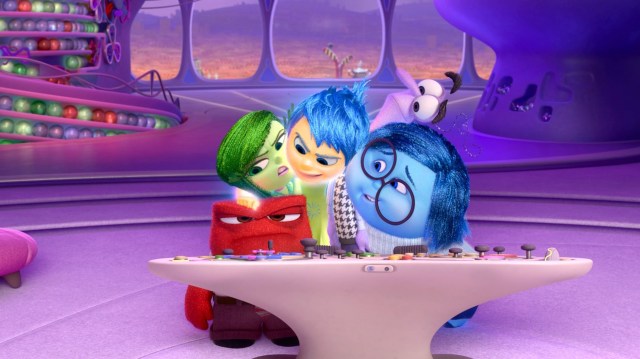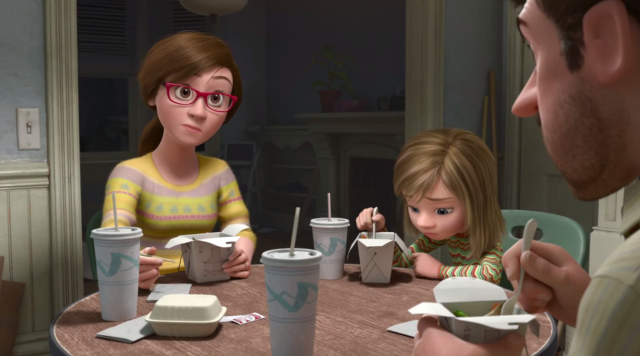Why I Was Overjoyed by Inside Out, Pixar’s Return to Form
I <3 Inside Out.

Warning: word vomit ‘n’ spoilers. Lots o’ it.
So, turns out I watch things besides anime sometimes, and well, I liked Inside Out. A lot. After months of terrible marketing and my own crowing on how Pixar was past its glory years, here came a film that quite honestly blew me away in how it handled its incredibly mature topics that I quite honestly don’t remember being addressed in kids’ films, and it turned out to be something that I can be proud to say is a return to form for the studio. Quite simply, it’s a family film that is narratively accomplished in a way that it takes such smart focus and care in depicting childhood transition that happens to coincide with an understandably stressful event (and, well, everything that is implied with that huge-ass statement).
As an intensely visual film, it not only shows stunning feats in animation and character design (I mean, the characters are made of constantly moving particles), but also in, perhaps unsurprisingly, the way that the film expresses itself in graphic diegesis. For every emotion and thought expressed, there’s a visual representation that turns out to be downright clever, such as seeing various aspects of Riley’s psyche being affected by her external environment (e.g. the train of thought going out of whack when she literally lost an aspect of her personality, and representing a moment in transition from childhood to adulthood by a fading imaginary friend, which is indicative of growing interdependence).
Part of what truly separates this movie from the train wreck it very well could have been is how it treats the psychological importance of Sadness, my personal favorite character. Treated by Joy as an unnecessary eventuality, Sadness proves herself to be an essential aspect in not only developing empathy (look at what happened with Bing Bong), but properly and healthily contextualizing emotions.
Parents ain’t perfect, and that’s ok:
Yet another important aspect of the film prevalent throughout is how kids have to deal with horrid, unfortunate, terrifying, completely normal parents. Like with most Parents, Riley’s are completely average individuals who sometimes misinterpret, mishandle, and misunderstand her actions and words. This is most prevalent in how they ask Riley to keep her chin up for their own sake (so they don’t have to acknowledge her gloominess), to the point of Sadness being literally kept in a corner, and, that serves no one well and is totally antithetical to healthy development.
Of course, this just leads to both Sadness and Joy being suppressed (going to the long term memory maze) and leads Riley to only contextualize things as Anger, Disgust, and Fear. However, this also leads Riley to not only take a step in the right direction towards interdependence (what with learning to contextualize emotions and all) but in falling, she gains an entirely different perspective and value of her life/family that she would have never had by being coddled or hovered over.
That aside, it’s also pretty refreshing to see a kids’ film tackle not a toxic broken home or infinitely perfect, wise guardians, but regular people having to deal with a tinier, less developed person, and sometimes having to deal with their decisions directly hurting that person. It’s a fact of life that I’m honestly delighted to see tackled so well in kids media.
So, there’s my two cents on the film. A clever, intelligent, cathartic, aesthetically accomplished, downright hilarious family film that is accessible to anyone, and that can and should be watched by anyone in any phase of life. It’s still readily available in theaters, and I know I’ll be lining up for the Blu-ray.
Rachael’s a student at a Florida university that frolics regularly in Disney parks and has an entirely too extensive collection of stuffed animals. If you wanna follow her other random musings on cartoons (or just stop by to say hi) there’s her blog https://lotsofframes.wordpress.com/.
—Please make note of The Mary Sue’s general comment policy.—
Do you follow The Mary Sue on Twitter, Facebook, Tumblr, Pinterest, & Google +?
Have a tip we should know? tips@themarysue.com

